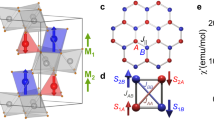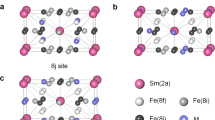Abstract
THE intensity of isothermal remanent magnetization of a ferromagnetic body usually increases with its cooling in non-magnetic space, owing to increase in spontaneous magnetization. We have found, however, that the direction of isothermal remanent magnetization of a single crystal of magnetite produced at room temperature is reversed at about −143° C in a cooling process in non-magnetic space. The sample examined by us was a single crystal of magnetite collected from Mituisi, Japan. The chemical composition (less than 0.3 per cent titanium dioxide content) and the X-ray data (a = 8.391 Å) of this sample indicate that it is nearly stoichiometric magnetite.
This is a preview of subscription content, access via your institution
Access options
Subscribe to this journal
Receive 51 print issues and online access
$199.00 per year
only $3.90 per issue
Buy this article
- Purchase on Springer Link
- Instant access to full article PDF
Prices may be subject to local taxes which are calculated during checkout
Similar content being viewed by others
References
Nagata, T., Ozima, M., and Yama-ai, M., Nature, 197, 444 (1963).
Uyeda, S., Jap. J. Geophys., 2, 1 (1958).
Ozima, M., Yama-ai, M., and Nagata, T., Geofisica Pura e Applicata (in the press).
Author information
Authors and Affiliations
Rights and permissions
About this article
Cite this article
YAMA-AI, M., OZIMA, M. & NAGATA, T. Self-reversal of Remanent Magnetization of Magnetite at Low Temperatures. Nature 198, 1188–1189 (1963). https://doi.org/10.1038/1981188b0
Issue Date:
DOI: https://doi.org/10.1038/1981188b0
This article is cited by
Comments
By submitting a comment you agree to abide by our Terms and Community Guidelines. If you find something abusive or that does not comply with our terms or guidelines please flag it as inappropriate.



